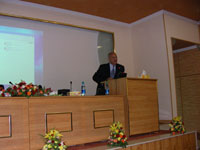HIV Workshop: Techniques in Quantification of HIV Genomes and Sub-species
Tripoli, Lybia, 18 -22 January 2010

- © UNESCO/M. Nalecz
- Dr Sharif at NASR where the HIV will take place
UNESCO and ASM (The American Society for Microbiology) are working with the Biotechnology Research Centre in Libya to organize the initial course of a multi-year African Training Series in Libya on topics of particular interest to the region.
The first workshop will be held in January 2009 with a focus on HIV gene mapping and methods of gene typing with Nobel Laureate Dr. Luc Montagnier, of the World Foundation for AIDS Research and Prevention, scheduled to present the opening lecture. ASM member Dr. Mark Wainberg, McGill AIDS Centre, will develop the scientific program, identify the relevant experts and participate in the workshop. Libya has long history of helping other African nations and the Biotechnology Research Centre in Libya, with the support of center director Dr. Mohammed Sharif, is both hosting and funding this program.
Goals of the workshop:
- Help African scientists to enhance their knowledge about HIV/AIDS health problem.
- Enhance the knowledge about the role of the new technology in diagnosing HIV/AIDS through a motivating scientific demonstration.
- Reduce the social and the economic burden of the disease through increasing the youth awareness and education about the disease.
- For the African scientists to take a part with the international community in reducing the spread of disease and migrate the impact of the disease.
Related links:
:: First announcement [.pdf]
- Source:UNESCO SC
- 10-10-2009

